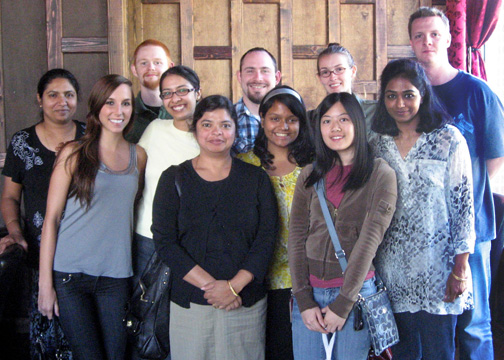Examples of Paramita Ghosh's Research

Dr. Paramita Ghosh has a long-standing interest in the study of receptor tyrosine kinases of the epidermal growth factor receptor (EGFR) family (Ghosh et al, 2001; Ghosh et al, 2004; Yeh et al, 2005; Kamat et al, 2008; Khan et al, 2010; Chen et al, 2010). The majority of these studies were funded by an R21 award from the NIH and an Idea Development Grant from the Department of Defense. Her lab is testing the efficacy of several established (FDA approved) EGFR, ErbB2 and pan-ErbB inhibitors as well as novel drugs in development under different conditions and in various combinations in prostate cancer. Animal studies are ongoing that will determine whether these novel drug combinations can be translated to clinical studies.
The PI3K/Akt/mTOR Pathway
In multiple publications (Ghosh et al, 2005; Wang et al, 2008; Chamie et al, 2008), Ghosh's lab has shown that androgen independence is characterized by the increased activation of the mTOR pathway, which has the ability to bypass the androgen dependent pathway regulating cell proliferation and apoptosis. These studies were funded by small grant awards from the Prostate Cancer Foundation and UC Davis Cancer Center, and provided preliminary data for a recent R01 award from the NIH. Ghosh's lab study downstream targets of mTOR to determine the mechanism of AR activation and growth inhibition by mTOR inhibitors. These studies led to an industry-sponsored Phase II clinical trial to test the efficacy of a drug combination of an mTOR inhibitor and an anti-androgen in patients with hormone refractory prostate cancer. Dr. Ghosh's laboratory performed the molecular correlative studies associated with this trial.
Ghosh's lab has identified a novel inhibitor of the PI3K/Akt pathway, the actin-binding protein Filamin A, which shown, is cleaved and exhibit nuclear localization in hormone responsive tumors whereas an uncleaved and cytoplasmic form is identified in androgen independent tumors. Ghosh's lab has shown this effect both in vitro (Wang et al, 2007) and in human prostate tissues obtained from men with prostate cancer (Bedolla et al, 2009). Inhibition of FlnA cleavage will indicate the onset of hormone refractory prostate cancer as we have shown that FlnA cleavage and the translocation of the cleaved fragment to the nucleus promotes castration sensitive cell growth. These studies are the basis for a funded VA Merit Award from the Department of Veterans Affairs.

